How Evidence-Based Coaching Models Empower Leaders?
Imagine going on a coaching journey where every decision, every insight, and each strategy had at its core some research. That is the very essence of evidence-based coaching, where rigorous studies in the areas of human behavior and organizational dynamics come together with practical applications in the real world. As a manager or L&D leader, you will appreciate how effective coaching can make a difference, but what if you took it one level up? If the guidance you gave wasn’t just instinctive but scientifically validated? Evidence-based coaching prepares you to make effective decisions that will actually drive outcomes in this changing landscape. It bridges the gap between theory and practice by plotting a roadmap to meaningful, lasting change within your organization. Seeking to raise team performance, foster a culture of continuous learning, or develop future leaders, evidence-based coaching empowers you with the tools and insights that guarantee success. Come with us as we explore the essence of evidence-based coaching, the models that bring it alive, and how this can unlock success for you and your organization.What is Evidence-Based Coaching?
An evidence-based approach to coaching links scientific research, empirical evidence, and tested and assured coaching models to guide the coaching process. This would involve data, psychological theories, and best practices validated through research in designing strategies and their implementation in the achievement of the coaching goals. The result will then be effective coaching interventions that ensure measurable improvement for the team regarding performance, development, and well-being. Leaders who engage in evidence-based coaching practice are typically involved in lifelong learning, updating themselves with the latest research and applying the most efficacious methods in their coaching practice. This approach usually follows the standards of the International Coaching Federation (ICF) guidelines. Some of the key elements which define evidence-based coaching are:- Scientific Foundation: Coaching practices are based on well-established psychological theories and research.
- Data-Driven Decisions: Leaders use data and feedback to individualize coaching interventions to the needs of the individual members of their teams.
- Continuous Improvement: Keep improving the coaching process cyclically by evaluating with new evidence and outcomes.
- Accountability: Focus on measurable outcomes to make sure coaching has produced tangible results.
The Essence of Evidence-Based Coaching in Leadership
Evidence-based coaching in leadership represents a mix of theoretical knowledge and practical use. This is a mix of research and proven methods. As a consequence, coaching practices are going to be based on factual evidence and best practices. Leaders will benefit from a structured way of using data and research to help create sustainable change and positive results. This makes your coaching efforts more precise and impactful, ensuring that the outcomes are measurable and aligned with your goals. It also sets a high standard for professional development, reinforcing the key elements of effective leadership.Distinguishing Between Traditional and Evidence-Based Coaching
Traditional coaching methods are based on personal experiences, instances, and gut feelings. Whereas, in evidence-based coaching known theories and fundamental research are applied.
When you compare traditional coaching to evidence-based coaching, the differences become quite clear. Traditional coaching often relies on a coach’s personal experience, intuition, and general best practices. While this can be effective, it sometimes lacks the rigorous approach needed to tackle complex leadership challenges. In contrast, evidence-based coaching takes a more structured approach. Instead of relying on intuition, it uses research-backed methods and data-driven insights to inform your coaching strategies. This means that the techniques you employ are grounded in proven theories and supported by solid evidence, providing a more reliable foundation for addressing leadership issues. While traditional coaching would have simply asked you for what others had worked with when facing similar circumstances, evidence-based coaching adapts its approach within your unique context to the broader base of scientific research. This ensures that any coaching provided is going to be most relevant and most effective in measurable results. You distinguish yourself as a leader committed to continuous improvement and excellence when you choose evidence-based coaching. You embrace a methodology focused on results, accountability, and the highest standards of coaching practice.How Can Evidence-Based Coaching Impact Your Organization’s Growth?
Evidence-based coaching can bring about remarkable development within your organization when done correctly. Using tested and tried research, as well as methodologies, you will end up with impressive results in developing your leaders. It allows introducing lasting change and resonating it in the company. As a leader who values evidence-based coaching, you can now help your team to build this culture of high standard and continual professional improvement. The embracement of this ideal gives rise to an environment where learning and improvement are just part of the ethos. You will be able to improve performance at all levels, from the top of the managerial pyramid down to the very bottom. Leaders well supported by evidence-based coaching will better be able to inspire their teams, drive strategic initiatives, and contribute to overall growth. Indeed, this holistic approach not only makes your people more capable but also strengthens your competitive edge and long-term success as an organization. For instance, one leader who had trouble with their team learned from a structured coaching process. This helped them improve teamwork and get better results. In another case, a manager worked on emotional intelligence through coaching. This led to higher employee engagement. These examples show how evidence-based coaching can create positive results. They can also bring about sustainable change in organizations. This shows the good use of theoretical knowledge in coaching practice.Core Models of Evidence-Based Coaching
Evidence-based coaching not only involve scientific research and empirical evidence but also, assured coaching models. The chief models used in evidence-based coaching are the GROW, CLEAR, OSCAR and Situational Leadership Models.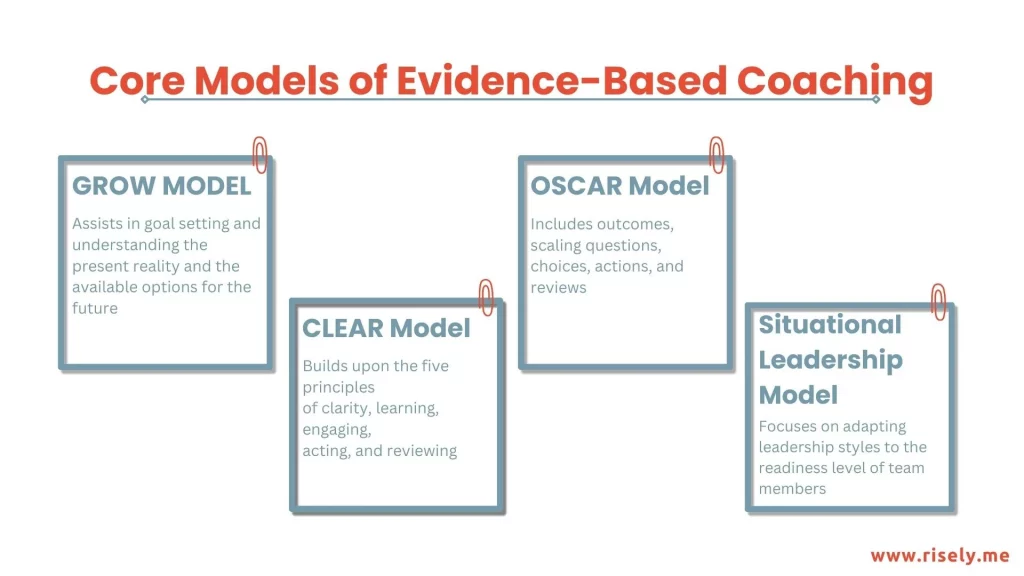
The GROW Model and Its Application in Leadership
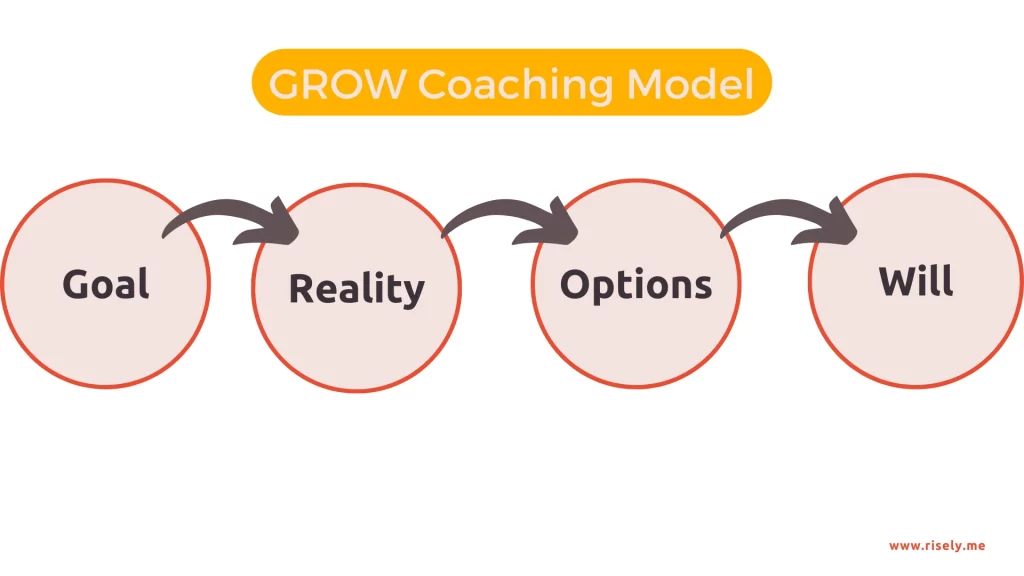
- First, a leader develops clear Goals.
- Then, the current Reality is checked.
- A leader then checks the Options that can be utilized.
- Finally, they develop the Will to act.
Utilizing the CLEAR Model for Effective Decision Making
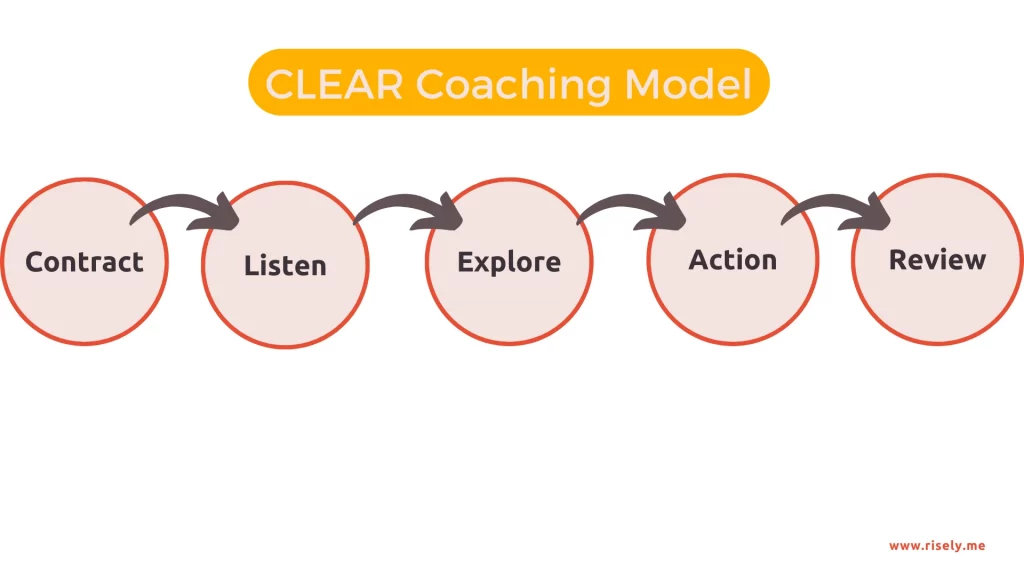
- Contract to define the coaching relationship’s goals and expectations
- Listen to understand the team’s concerns and aspirations through active listening and open-ended questions
- Explore different perspectives and options to gain insights and identify solutions
- Action to create a concrete plan with specific steps and timelines
- Review to regularly assess progress and adjust the plan as needed.
Integrating the OSCAR Model into Leadership Practices
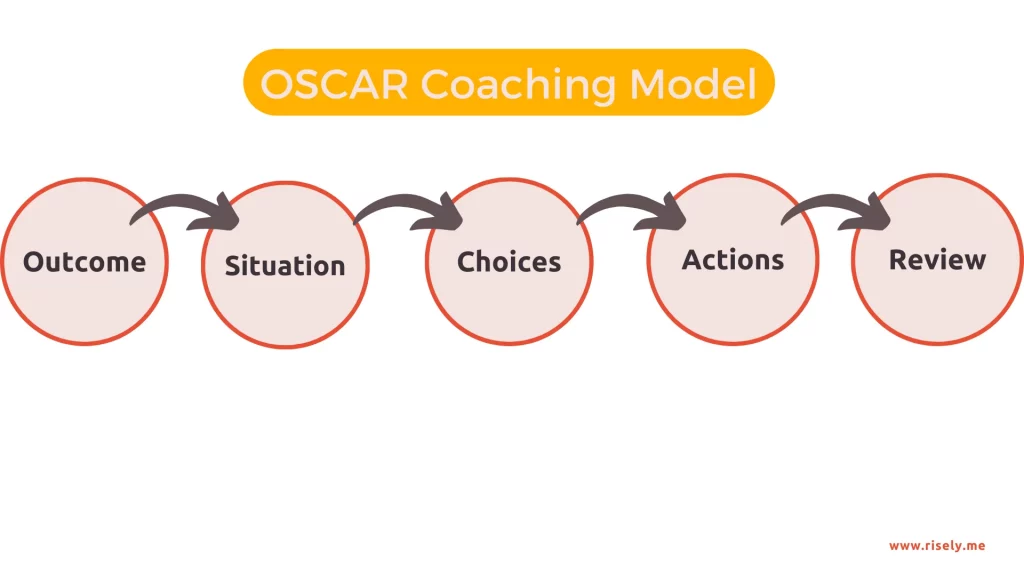
- Defining the Outcome, where you help your team clarify their goals and desired results.
- Next, Situation involves exploring their current state and challenges to understand barriers.
- During Choices, you facilitate brainstorming to generate and evaluate options for achieving the outcome.
- In the Actions step, you assist in developing a concrete action plan with specific steps and deadlines.
- Finally, Review involves regularly assessing progress, discussing outcomes, making adjustments, and celebrating achievements to ensure continuous improvement.
The Situational Leadership Model
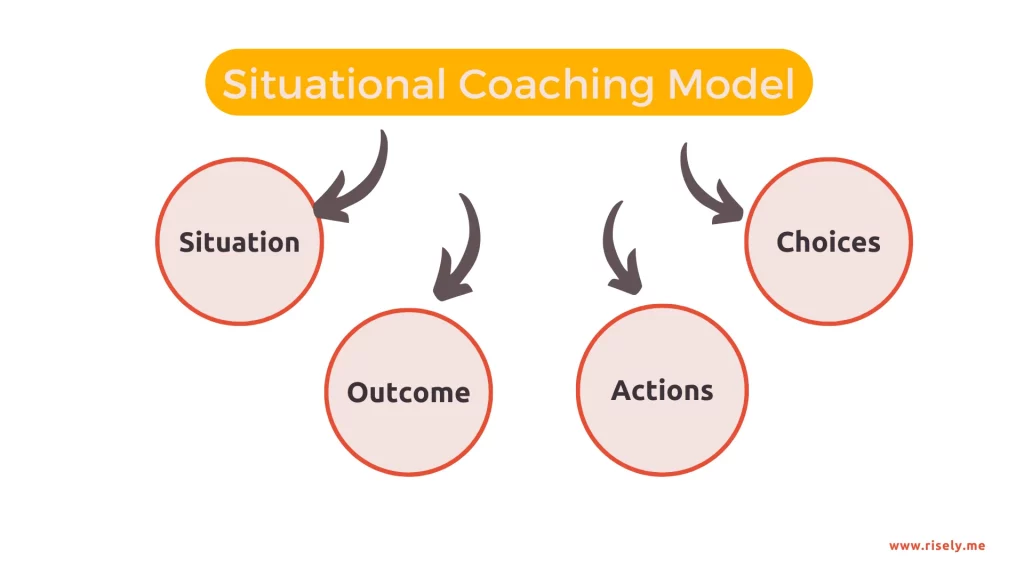
- In the Directing phase, you provide clear instructions.
- Coaching involves more two-way communication and support to develop skills.
- Supporting is about encouragement and assistance as needed.
- Finally, Delegating means entrusting tasks to individuals once they are competent.
How to Implement Evidence-Based Coaching in Your Organization?
To successfully use evidence-based coaching as part of your organization’s L&D strategy, it is important to prepare your team. Start with training your fellow L&D leaders and managers about evidence-based coaching. Make sure they know why monitoring and evaluating coaching outcomes is key for improving always. By building a culture that respects empirical research and high standards in coaching practice, you can create lasting change. Keeping an eye on the coaching process and following best practices will help you get positive results and grow your organization.Preparing Your Organization for Evidence-Based Coaching
Moving into evidence-based coaching assumes your organization is ready. First, set up a culture that values continual learning and development. Make sure there are resources for coach training and best practices certification. Goal setting with performance measures is also necessary. All members of the organization are required to apply a coaching mindset in all they do. Focus on the value of feedback and reflection. With this enabling environment for evidence-based coaching, your organization will flourish positively and grow sustainably.Training Leaders to Adopt Evidence-Based Coaching Practices
To properly prepare leaders with solid coaching skills, good coach training as well as adaptability to changes is very important. Leaders especially need those courses of learning that combine what they have learned in theory with real-life use. These courses should follow the best practices recommended by top coaching groups like the International Coaching Federation (ICF). With ideas such as emotional intelligence and the making of action plans, leaders could help their teams bear fruit. Learning evidence-based coaching through well-structured training helps make lasting change and strong leadership growth.Monitoring and Evaluation of Coaching Outcomes
The coaching process will demand that the respective outcomes be closely monitored and evaluated to ensure that they work well. Organizations can utilize techniques such as action plans and feedback during the process of monitoring impact. Key performance indicators should be tracked, and progress should be checked against the preset goals. This, thus, ensures continuous improvement, demonstrates successful coaching, and ensures that coaching outcomes are consistent with organizational objectives. It helps to create a culture of accountability and, therefore, builds the future development of the organization.Challenges and Solutions to Evidence-Based Coaching
You’ll find that evidence-based coaching can become very difficult for you if there’s resistance towards new methods that comes your way and a requirement to adapt to different leadership styles. This requires aligning coaching methods with what will most resonate with your team and, at the same time, meets organizational needs for effective and sustainable change.Common Obstacles
You are going to meet, of course, some kind of resistance from those people who are really unwilling to step out of their square in coaching or do not understand the real benefits associated with evidence-based coaching practices. Attitudes to new methods and professional development need changing. Demonstrate how evidence-based coaching produces better outcomes and why it’s a change worth making.Overcoming Resistance
If you encounter some resistance to new coaching techniques, highlight how evidence-based methods align with organizational goals and even demonstrate their effectiveness. Provide training and support to work through the transition and share case studies of success to gain confidence. Culturing a setting of continuous learning and improvement will be key to embracing new coaching approaches for you and your team.Tailoring Coaching
Customize your coaching differently for each of the unique styles of leaders being coached. For example, with a directive leader, provide specific action plans; with a collaborative leader, use goal-setting techniques. Tailor your coaching in this regard to ensure growth and ultimately drive successful outcomes, which will help make your coaching efforts more effective.Conclusion
In conclusion, evidence-based coaching is a helpful method that blends theory with real-world use. This makes coaching better. When organizations use best practices and follow professional coaching standards from the International Coaching Federation (ICF), they can create lasting change and good results. Keeping high standards in coach training and certification means that coaching is based on solid research and meets personal needs. By using evidence-based coaching methods, organizations can boost professional growth and achieve success.Unlock your leadership potential with AI-driven coaching!
Start today and unlock the full potential of your team, driving sustained success and fostering an environment where everyone can thrive.
How to Build a Leadership Journey? ft. Thomas Ulbrich
Effective leadership doesn’t always begin with a grand vision. Sometimes, it takes root in the courage to take the first…
AI and Leadership Development: Driving Synergy for Growth
AI and Leadership Development: Driving Synergy for Growth You know the frustration all too well. Your organization invests thousands in…
How Are AI Learning Platforms Transforming Leadership Development?
As an L&D leader, you’re likely familiar with this frustrating reality: 82% of organizations consider leadership development critical(1), yet only…
5 Essential AI Skills for L&D Leaders
5 Essential AI Skills for L&D Leaders According to LinkedIn’s 2025 Workplace Learning Report(1), 71% of L&D professionals are now…
How to Create a Course with AI: A Guide for L&D Professionals
How to Create a Course with AI: A Guide for L&D Professionals According to a McKinsey survey(1), only 11% of…


